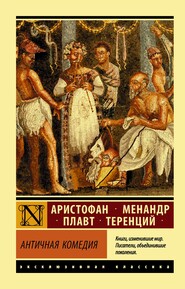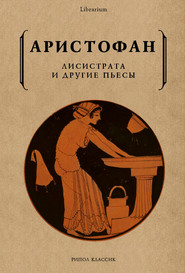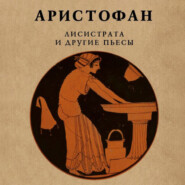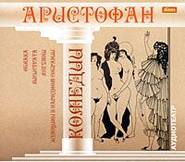По всем вопросам обращайтесь на: info@litportal.ru
(©) 2003-2024.
✖
The Eleven Comedies, Volume 1
Автор
Год написания книги
2018
Настройки чтения
Размер шрифта
Высота строк
Поля
530
Both sons of Zeus.
531
Hyperbolus had supported Meton in his desire for reform. Having been sent as the Athenian deputy to the council of the Amphictyons, he should, like his colleagues, have returned to Athens with his head wreathed with laurel. It is said the wind took this from him; the Clouds boast of the achievement.
532
These are poetical measures; Strepsiades thinks measures of capacity are meant.
533
Containing four choenixes.
534
So called from its stirring, warlike character; it was composed of two dactyls and a spondee, followed again by two dactyls and a spondee.
535
Composed of dactyls and anapaests.
536
[Greek: Daktylos] means, of course, both dactyl, name of a metrical foot, and finger. Strepsiades presents his middle finger, with the other fingers and thumb bent under in an indecent gesture meant to suggest the penis and testicles. The Romans for this reason called the middle finger 'digitus infamis,' the unseemly finger. The Emperor Nero is said to have offered his hand to courtiers to kiss sometimes in this indecent way.
537
Meaning he was too poor, Aristophanes represents him as a glutton and a parasite.
538
A woman's name.
539
He is classed as a woman because of his cowardice and effeminacy.
540
In Greek, the vocative of Amynias is Amynia; thus it has a feminine termination.
541
The Corinthians, the allies of Sparta, ravaged Attica. [Greek: Kor], the first portion of the Greek word, is the root of the word which means a bug in the same language.
542
Mirrors, or burning glasses, are meant, such as those used by Archimedes two centuries later at the siege of Syracuse, when he set the Roman fleet on fire from the walls of the city.
543
That is, the family of the Alcmaeonidae; Coesyra was wife of Alcmaeon.
544
Socrates was an Athenian; but the atheist Diagoras, known as 'the enemy of the gods' hailed from the island of Melos. Strepsiades, crediting Socrates with the same incredulity, assigns him the same birthplace.
545
i.e. the enemies of the gods. An allusion to the giants, the sons of Earth, who had endeavoured to scale heaven.
546
Pericles had squandered all the wealth accumulated in the Acropolis upon the War. When he handed in his accounts, he refused to explain the use of a certain twenty talents and simply said, "I spent them on what was necessary." Upon hearing of this reply, the Lacedaemonians, who were already discontented with their kings, Cleandrides and Plistoanax, whom they accused of carrying on the war in Attica with laxness, exiled the first-named and condemned the second to payment of a fine of fifteen talents for treachery. In fact, the Spartans were convinced that Pericles had kept silent as to what he had done with the twenty talents, because he did not want to say openly, "I gave this sum to the Kings of Lacedaemon."
547
The basket in which Aristophanes shows us Socrates suspended to bring his mind nearer to the subtle regions of air.
548
The scholiast tells us that Just Discourse and Unjust Discourse were brought upon the stage in cages, like cocks that are going to fight. Perhaps they were even dressed up as cocks, or at all events wore cocks' heads as their masks.
549
In the language of the schools of philosophy just reasoning was called 'the stronger'—[Greek: ho kreitt_on logos], unjust reasoning, 'the weaker'—[Greek: ho h_ett_on logos].
550
A character in one of the tragedies of Aeschylus, a beggar and a clever, plausible speaker.
551
A sycophant and a quibbler, renowned for his unparalleled bad faith in the law-suits he was perpetually bringing forward.
552
The opening words of two hymns, attributed to Lamprocles, an ancient lyric poet, the son or the pupil of Medon.
553
A poet and musician of Mitylené, who gained the prize of the lyre at the Panathenaea in 457 B.C. He lived at the Court of Hiero, where, Suidas says, he was at first a slave and the cook. He added two strings to the lyre, which hitherto had had only seven. He composed effeminate airs of a style unknown before his day.
554
Zeus had a temple in the citadel of Athens under the name of Polieus or protector of the city; bullocks were sacrificed to him (Buphonia). In the days of Aristophanes, these feasts had become neglected.











